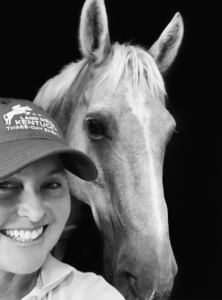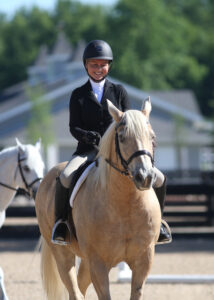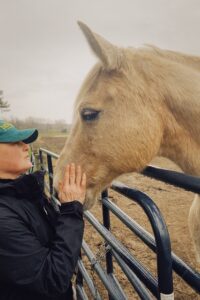Editor’s Note:
Board Member Elisabeth Black is a Southern California native living in central Ohio with her husband, horse, and golden retriever. She’s a marketing and design specialist as well as registered Yoga instructor. She has a passion for research and learning that is driven by the desire to continuously improve the quality of life for animals and humans alike. She loves exploring new activities and terrain with her horse, Leo, as well as riding hunters and learning dressage. She devotes much of her free time to research on equine health, fitness, neuro- and flow sciences. She loves utilizing her skills to bring awareness to new ways of thinking about and benefitting the horse.

Elisabeth and Leo
Elisabeth writes:
As you were chatting in the Adult Learning episode, I started to ask myself: How do you know when you should change trainers or your training methods?
Sometimes it’s obvious, like when you have a full-body “Yes!” or even more clear is the “Hellll No!” But what about the subtle, “Hmmm…I really love my trainer and, I also feel that maybe this is no longer the most optimal thing for this horse at this time.”
I decided to fully pursue my passion of riding in my late 40’s. Growing up at the beach in Southern California didn’t afford me much space with horses beyond a lesson here and there. When we moved to the Midwest for my husband’s work five years ago, I finally had the space and opportunity to pursue a life with horses. Through coincidence, my neighbor was an eventing trainer. We became friends and I started training with her. A year later she helped me find a horse to buy. A mostly-green, draft-cross gelding that I planned to take fox hunting and maybe eventing. He was lovely and also needed a lot of training. I bought him with the stipulation to my trainer, “You can never leave us, because I don’t know how to train a horse.” She was my safety blanket.
 It was apparent to me from the beginning that my horse had some baggage. (Don’t we all?). I tried every kind of natural horsemanship, trauma release, energy work, etc to help him through it, but he wasn’t having it; he was smart and obedient yet angry and shut-down.
It was apparent to me from the beginning that my horse had some baggage. (Don’t we all?). I tried every kind of natural horsemanship, trauma release, energy work, etc to help him through it, but he wasn’t having it; he was smart and obedient yet angry and shut-down.
My trainer instinctively knew how to work him from the top down and he slowly learned to be correctly ridden and to open up emotionally. We found out that he is absolutely not built for eventing, but he does love to jump and hunt and is super cute in dressage. Each year his funny, sweet, true character became more apparent, and also the structured nature of his training seemed maybe too strict or not quite the best fit. He was bored and still required me to completely hold him together. There were a few pale pink flags for me, but there was nothing observably wrong, no mistreatment, nothing that made me want to leave my trainer, quite the opposite – I still considered her my safety blanket, but I had a sense that things could be better and that feeling was nagging at me.
By absolute chance, I needed to fill in with another trainer for a few months and the lady I found was a well-known Hunter Jumper. From the first time she rode him, he was a different horse. He looked like an Equitation Hunter. He carried his own giant, drafty self on a loose rein, I could barely believe my eyes. He also seemed genuinely relaxed. That was when the questions poured in:
“Should I switch to a different trainer? I can’t leave my friend!
What does my horse want? I’m pretty sure he adores her.
Do I switch to a new discipline?
Can I get her to train us differently?”
 When I told my friend/trainer how amazing my horse was doing, she didn’t believe me. She said it was false collection, and essentially forbade me ride him in a forward seat. I was deflated. Of course, it’s hard to hear that your friend and client has found a different path, and maybe wants to leave you. It’s also a lot of money to lose.
When I told my friend/trainer how amazing my horse was doing, she didn’t believe me. She said it was false collection, and essentially forbade me ride him in a forward seat. I was deflated. Of course, it’s hard to hear that your friend and client has found a different path, and maybe wants to leave you. It’s also a lot of money to lose.
I stayed with her for another six months and although she is my friend, we needed to pivot. In that time, she might have worked my horse a little harder (hoping to make more noticeable progress) and he had a series of mishaps. I needed to do what was best for us and I actually did know what that was. I would have to make a change, I would have to move and I would have to give up my safety blanket.
I took a leap of faith and moved to a new facility. The hunter jumper trainer took over at the same time. It was uncomfortable to be without my friend, but I held onto the idea that we were going to do things differently. We were evolving our training to meet evolving needs, even though I wasn’t sure exactly how or what that would be. We’d have to experiment.
The young trainer is very soft and intuitive with him. Leo is relaxed and I am relieved. She started him over slowly; long, low and stretchy, listening to him intently, giving him all the time he needed to recover and re-build. He looks and feels amazing. He has integrated all his previous training with a softer, freer feel. The girls love to watch our lessons and everyone comments at how soft and handsome he is.
My chunky little dude looks like a show horse, but moreover he glows and everyone can see it. I appreciate all the trainers that have contributed to our success and I appreciate that I can make good decisions for us.
So, to answer my own question I would say that it’s important to listen to your gut, not just when it shouts but also when it whispers, and that is true for all situations.
Glad you stayed with horses. Many would have bailed. You had to make some tough decisions. Thanks for sharing your journey.